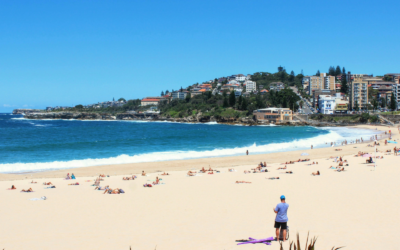Written by Lidya Rivai | Edited by Luci Kugathasan
Whether you live in suburbia, near a CBD, or you’re just out for a stroll, you’re bound to spot one of these little street libraries, housed in a cosy nook of your neighbourhood.

(Two members of Book Club standing in front of the Street Library. Photo credit: Lidya Rivai, 2024)
Western Sydney University jumped on the bandwagon in late 2023 by installing its own street library, and Book Club had the privilege of hosting a launch event to mark the official opening of the street library on April 3rd at Campbelltown Campus.

(Two members of Book Club showing off their prizes in front of the Book Club stall. Photo credit: Lidya Rivai, 2024)
In addition to encouraging students to utilise the street library, the Book Club had other activities such as trivia, blind date with a book, bookmark-making and, of course, free food and drinks! Other university members, including staff from the Student Services Hub and curious librarians, joined. The weather was perfect for discussing the Book Club’s favourite novels and many of our members came away with a new book!
So… What exactly is a street library?
A street library, also known as a little library or book box, is both a community project and a place that encourages book lovers in an area to share and exchange stories. Anyone is free to leave a book, borrow a book or even take a book!
Although engaging with literature has been a leisure activity for centuries, in the contemporary landscape, social media platforms such as TikTok and YouTube have given rise to engaging with books not only to those around you but also with people from all over the world. The Book Club interviewed Marlene Henry, Head of Placements at Western Sydney and the organiser of the Street Library placed in Campbelltown, about her thoughts on reading, books, and street libraries.
She mentioned that one of the beauties of a street library is that you can see what other people have placed inside while keeping the participants’ identities completely anonymous. Henry’s local Camden library regularly removes books from its collection, providing another way to obtain books. However, she notes that not everyone lives near a local library and having a street library increases accessibility to reading materials.
She mentions how she first saw the street libraries overseas before they began booming in Australia. As a member of the University community, she says “We’re always trying to find things on campus that engage students & staff”. Campbelltown campus is particularly unique in its design. The layout is long and wide, so to create a central meeting point the street library was erected in one of the major walkways, between Building 5 & 7. Henry wanted to create a safety point on campus centered around reading where students could also allow their imaginations to flourish. Henry said, “Why not put one up on campus so that those who are already participating in other events and attending classes can have the opportunity to pick up a great book, too?”
After the Campbelltown Campus Provost was introduced to the notion of installing street libraries, it was unanimously supported with every other campus now aiming to add one. Henry adds that “Books are expensive. Lots of people don’t have the money to buy a book and students especially don’t have that kind of money to buy books”. Books can be repurposed through individuals using street libraries.
The construction of street libraries also combats the hyper-consumerism that can run rampant in not just the book community, but also in every facet of our lives. Unfortunately, as is typical in a fast-paced and consumerist-centric space like social media, there are growing concerns that being a bookworm or ‘bookish’ is correlated not just with how many books you’ve read, but with the size of your collection. When asked about the impact of a street library, it was heartening to hear then, that Henry states “if [a book is] the one thing they find pleasure in, if it’s made [their day] day, that’s made the difference for them, that’s a fantastic way to give back”.
When asked about her background in reading, it was a pleasant surprise to find out that Henry runs an online review page on her Instagram (@henrymarlene). She also regularly attends bookish events such as author interviews, book signings and book clubs. She states: “[I’ve been a] reader all my life and I found that all I wanted to do was reading, but I wanted to have record of what I’m reading. I knew Goodreads existed, but I wanted to take a photo and write down my thoughts.”

(Marlene Henry, the organiser of the Street Library’s installation, holding two of the latest books she’s reading. Photo credit: Lidya Rivai, 2024)
Henry says she likes “to really unpack what’s resonated with me” and like her and many other readers across the world, Book Club members also enjoy sharing their thoughts on their most recent read. Book Club & W’SUP have collaborated to provide members with the opportunity to have their reviews published on the W’SUP Goodreads page (WSUP Group (3 Members) | Goodreads)! All you have to do is read a book and then jot down your notes in this form: https://au.cglink.me/2ih/s2968.
We’re so excited to see everyone’s thoughts and can’t wait to see you all at the Street Library over at Campbelltown! If you want to see more of what the Book Club does, be sure to join us on WESTERNLife (https://life.westernsydney.edu.au/BookClub/club_signup) and follow us on Instagram (𝐁𝐨𝐨𝐤 𝐂𝐥𝐮𝐛 (@wsubookclub) • Instagram photos and videos).



